Divide & Conquer
Stephanie Kelley
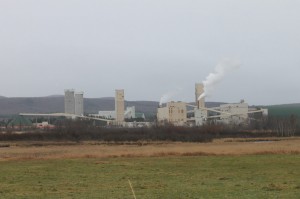
As it turns out, there is already some extensive natural gas extraction going on right now just outside of Sussex, in Penobsquis. Members of this community have been engaged in a pitched legal battle with PotashCorp and Corridor Resources since 2004. In the late 90’s, water flooded the mine and Corridor was completing rounds of seismic testing. Subsequently, around 60 homes lost their water supply.
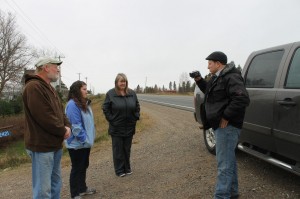
Beth Nixon and Heather McCabe are two of the most outspoken local activists, and they graciously took Joe and I on a tour of the area that lasted for several hours.
As with the fight going on in the bigger stage of New Brunswick, with the pro-shale gas citizens hoping for jobs and economic development, Penobsquis has become a community divided as PotashCorp provides about 500 local jobs.
The people who depend on this company for their livelihood do not want the applecart upset….their jobs are understandably very important. And practically everyone in the community is related to someone who works for this company, so Penobsquis is ground zero for our own provincial Civil War.
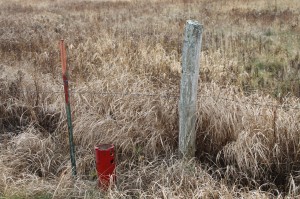
slipping sideways
This person was polite but nervous, and did not want the business associated with any activism or controversy.
We regrouped and met at Wayne’s home, then began our tour. Beth and Heather have provided this tour to many visitors, who, like Joe and myself, want to see for themselves what impact the mining and gas extraction industries are having on the land and the lives of the people of the community.
We began by driving past the potash mine. Production at this mine began in the 80’s. The potash mined at this facility is, ironically, nearly all shipped to South America where it is used to fertilize crops that are processed into bio-fuel.
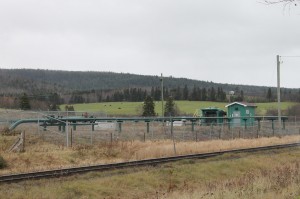
Yeah, us neither.
This is a completely subjective observation, of course, and maybe I was coming down with something…. but, about an hour after we left town and were no longer breathing the local air my sore throat was gone.
Mining for potash is an underground excavation process. As soon as the mining operation began, the company put in monitors to track ground subsidence and slippage. When you excavate underground, the surface sinks, develops sinkholes and the water table shifts.
By the late 90’s the residents of Penobsquis were experiencing all of these issues. Their wells and springs dried up, septic systems had to be re-dug, and houses and buildings began to sink into the ground.
Over a period of 10 years, the ground has sunk down .75 meters and slipped sideways by .5 meters. Sinkholes have appeared overnight in fields and yards.
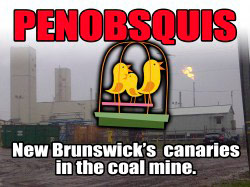 This area was once lush and beautiful farmland, some families have been here for seven generations. Now, properties are devalued and farmland is lost forever. Once productive fields have been turned into marsh.
This area was once lush and beautiful farmland, some families have been here for seven generations. Now, properties are devalued and farmland is lost forever. Once productive fields have been turned into marsh.
The railway that runs through Penobsquis sits on this sinking ground, which has caused the rails to loosen in their beds. The tracks run next to a number of the gas wells as you can see in the photo. Freight trains with crude oil tankers regularly travel over these tracks. A derailment next to a gas well would be a disaster.
After a lengthy legal dispute, in which PotashCorp and Corridor Resources did not admit to any responsibility for the loss of water or damage to these homes, affected residents now have a water supply again that is piped in from an outside source.
But, it is now a community that is being destroyed from within by fear and conflict.
Is this the future we want for the rest of New Brunswick?
